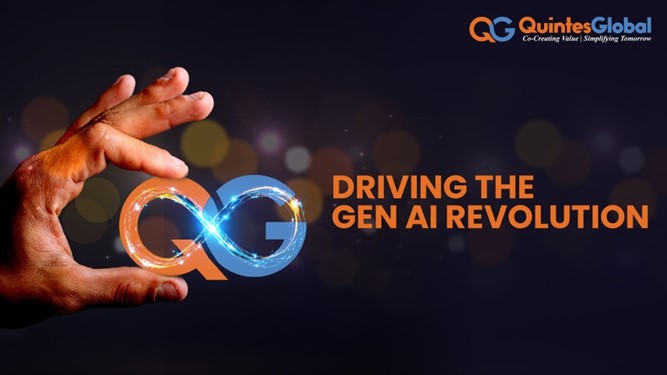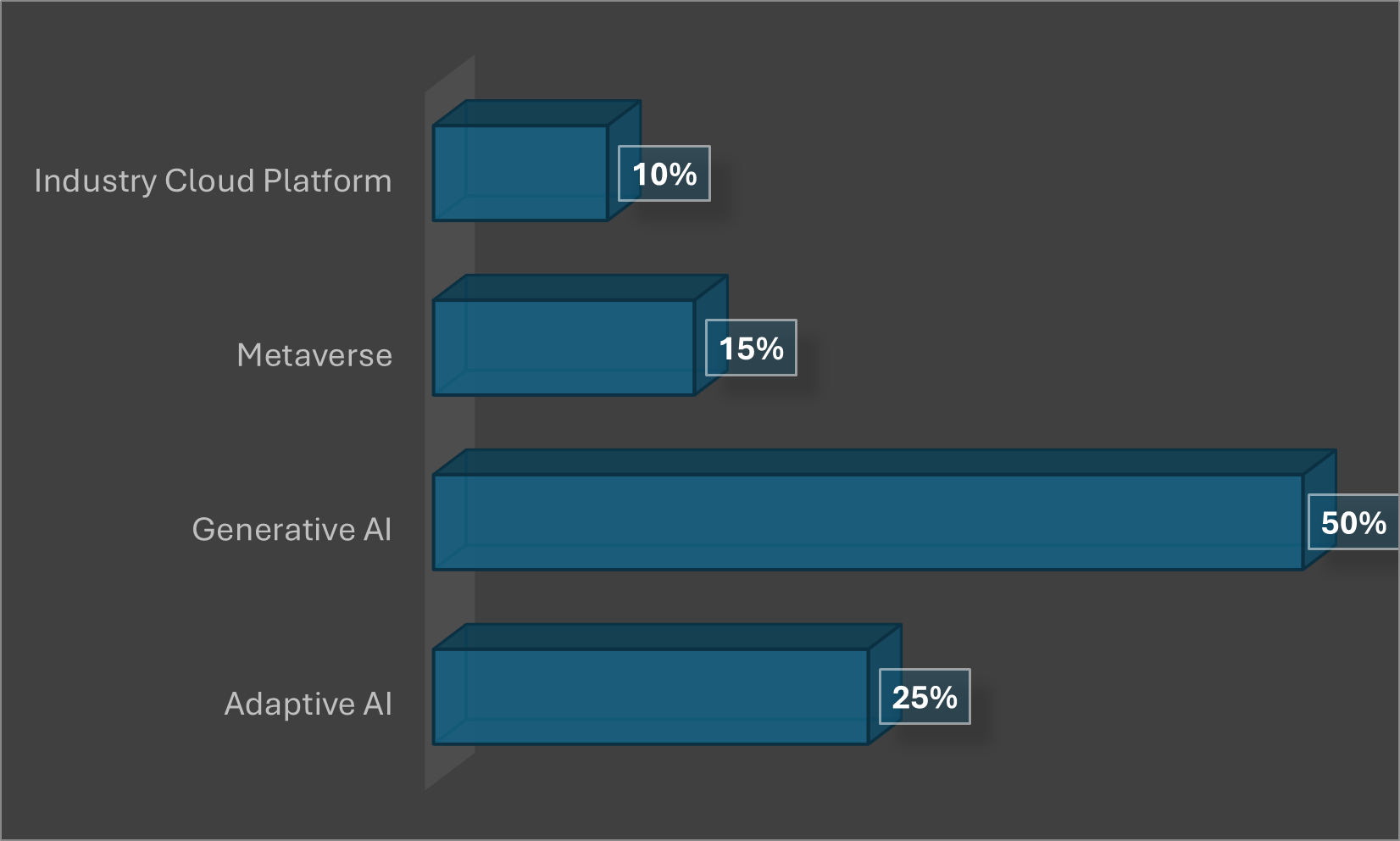
The Technological Frontier: Gen AI's Transformative Potential
Key Technologies Shaping the Future of GBS/ GCCs
“Gen AI is the top priority for 70% GCCs in India.”

As technology continues to advance at an extraordinary pace, organizations are navigating a transformative wave of innovation to enhance efficiency, agility, and strategic outcomes.
With this backdrop, a recent LinkedIn poll sought to identify which emerging technology is poised to exert the most substantial impact over the next five years. The results provide key insights into the future of Global Enterprise/ Business Services and Global Capability Centres (GCCs):
- Generative AI emerged as the most impactful technology, securing 50% of the votes.
- Adaptive AI followed with 25%, underscoring its rising significance.
- The Metaverse received 15%, reflecting its growing role in immersive collaboration.
- Industry Cloud Platforms garnered 10%, highlighting their focused yet steady value proposition.
These findings highlight the transformative potential of emerging technologies, particularly Gen AI, while emphasizing the complementary roles of Adaptive AI, Metaverse, and Industry Cloud Platforms in reshaping the GBS and GCC ecosystem. This article explores how these technologies are driving advancements, with practical applications and examples from the global enterprise services landscape.
1. Gen AI: The Catalyst for Innovation (50%)
According to a leading Research Centre, Gen AI could add up to $4.4 trillion annually to the global economy. In the India context, this translates to unprecedented opportunities for digital transformation and economic growth.
We see notable concrete technological Commitments in Budget 2024:
The Union Budget 2024 provides tangible evidence of India's technological ambitions:
- ₹10,371.68 crore allocated for digital initiatives
- 5% increase in digital infrastructure investments compared to the previous fiscal year
- Specific funding of ₹1,250 crore for AI and machine learning research and development
Let us assess the Quantifiable Impact in Industry-Specific Transformation:
- Healthcare Revolution: A Technology Report 2024 published by a multinational
consulting firm, highlights Gen AI's potential:
- 35% reduction in diagnostic time
- 28% improvement in treatment personalization
- Financial Services Insights by another leading research and advisory firm
reveals:
- Potential cost savings of up to ₹3,200 crore through intelligent process automation
- 50% improvement in fraud detection accuracy
- Agricultural Technology Breakthrough: An AgriTech report demonstrates
remarkable potential:
- 35% reduction in water usage through AI-driven precision farming
- Estimated economic benefit of ₹12,000 crore to the agricultural sector
Gen AI leverages advanced machine learning models to automate processes, and solve complex challenges. Its significant impact within GBS/ GCCs span multiple domains include:
- Process Automation: Gen AI is automating labour-intensive tasks such as regulatory reporting, financial reconciliation, and customer communication. GCCs are using AI-driven models to reduce human intervention and enhance operational accuracy.
Case Example: A GBS of one of the leading manufacturing industries in India, implemented Gen AI to automate report generation, reducing manual effort by 60% and improving turnaround times.
- Intelligent Customer Support: Gen AI enables hyper-personalized, real-time customer interactions. GBS units are leveraging AI-powered virtual agents to handle complex customer service workflows efficiently.
Case Example: Another GCC of a manufacturing organization based in India uses AI-driven chatbots to handle vendor inquiries, improving resolution rates while enhancing customer satisfaction.
- Knowledge Management and Upskilling: Gen AI supports employee development through dynamic learning tools and simulated environments tailored to business scenarios.
Case Example: A Pharma GCC utilized Gen AI to create interactive, role-specific training modules, improving employee productivity by 35%.
According to a leading Research Centre, Gen AI could add up to $4.4 trillion annually to the global economy. In the India context, this translates to unprecedented opportunities for digital transformation and economic growth.
We see notable concrete technological Commitments in Budget 2024:
The Union Budget 2024 provides tangible evidence of India's technological ambitions:
- ₹10,371.68 crore allocated for digital initiatives
- 5% increase in digital infrastructure investments compared to the previous fiscal year
- Specific funding of ₹1,250 crore for AI and machine learning research and development
Let us assess the Quantifiable Impact in Industry-Specific Transformation:
- Healthcare Revolution: A Technology Report 2024 published by a multinational
consulting firm, highlights Gen AI's potential:
- 35% reduction in diagnostic time
- 28% improvement in treatment personalization
- Financial Services Insights by another leading research and advisory firm
reveals:
- Potential cost savings of up to ₹3,200 crore through intelligent process automation
- 50% improvement in fraud detection accuracy
- Agricultural Technology Breakthrough: An AgriTech report demonstrates
remarkable potential:
- 35% reduction in water usage through AI-driven precision farming
- Estimated economic benefit of ₹12,000 crore to the agricultural sector
Gen AI leverages advanced machine learning models to automate processes, and solve complex challenges. Its significant impact within GBS/ GCCs span multiple domains include:
- Process Automation: Gen AI is automating labour-intensive tasks such as regulatory reporting, financial reconciliation, and customer communication. GCCs are using AI-driven models to reduce human intervention and enhance operational accuracy.
Case Example: A GBS of one of the leading manufacturing industries in India, implemented Gen AI to automate report generation, reducing manual effort by 60% and improving turnaround times.
- Intelligent Customer Support: Gen AI enables hyper-personalized, real-time customer interactions. GBS units are leveraging AI-powered virtual agents to handle complex customer service workflows efficiently.
Case Example: Another GCC of a manufacturing organization based in India uses AI-driven chatbots to handle vendor inquiries, improving resolution rates while enhancing customer satisfaction.
- Knowledge Management and Upskilling: Gen AI supports employee development through dynamic learning tools and simulated environments tailored to business scenarios.
Case Example: A Pharma GCC utilized Gen AI to create interactive, role-specific training modules, improving employee productivity by 35%.
Adaptive AI: Driving Agility and Realtime Insights (25%)
Adaptive AI systems go beyond traditional AI by continuously learning and adapting to dynamic business conditions. This technology is particularly valuable in improving decision-making, optimizing processes, and building resilience.
- Dynamic Decision-Making: Adaptive AI is enabling real-time decision support across critical GBS processes such as risk management, fraud detection, and supply chain optimization.
Case Example: A BFSI GCC deployed Adaptive AI to monitor credit risk, dynamically adjusting loan approval processes and improving response times by 30%.
- Personalized Business Outcomes: Adaptive AI models are being used to customize services and optimize client-specific workflows. In healthcare GCCs, AI-driven systems adapt to patient data trends, improving clinical decision support.
- Continuous Process Optimization: Shared services organizations are applying Adaptive AI for real-time process adjustments, ensuring accuracy, speed, and resource optimization.
Case Example: A global logistics GCC implemented Adaptive AI to optimize invoice processing, reducing error rates and improving reconciliation timelines.
3. The Metaverse: Redefining Collaboration and Engagement (15%)
The Metaverse, though still emerging, offers innovative solutions for collaboration, training, and customer engagement in the enterprise services space.
- Virtual Workspaces: GCCs are exploring immersive virtual environments to enhance collaboration among geographically dispersed teams.
Case Example: A multinational GBS unit implemented virtual collaboration spaces to simulate office interactions, improving employee engagement and creative outcomes.
- Training and Onboarding: The Metaverse is being leveraged to create interactive onboarding and skill-building experiences, delivering impactful and immersive learning.
Case Example: A retail GCC deployed Metaverse-driven onboarding modules, reducing time-to-productivity for new hires by 20%.
- Customer Simulations: Industries like retail and automotive are piloting virtual customer experience simulations to optimize service delivery and enhance engagement.
Case Example: A retail GCC integrated Metaverse-driven product simulations to provide insights into consumer behaviour, helping improve marketing strategies.
4. Industry Cloud Platforms: Enabling Scalable and Secure Transformation (10%)
Industry Cloud Platforms provide industry-specific cloud solutions, enabling organizations to standardize, scale, and optimize their operations. Although they ranked lowest in the poll, their strategic relevance in GCCs remains undeniable.
- Scalable Infrastructure: By adopting tailored cloud platforms, GCCs can consolidate operations across regions, reducing operational redundancies and costs.
Case Example: A BFSI GCC migrated its global payment operations to an industry cloud platform, achieving 20% cost savings and streamlined compliance management.
- Regulatory Compliance: Industry Cloud Platforms provide inbuilt compliance tools to address sector-specific regulatory requirements, particularly in BFSI, healthcare, and manufacturing.
Centralized Operations: These platforms offer a unified approach to data management, enabling GCCs to deliver consistent and efficient services to enterprise clients.
A Converging Future: Leveraging Synergies Across Technologies
Another global consulting firm offers an optimistic projection of the potential impact from Gen AI adoption. Their analysis suggests that Gen AI could contribute 1.5% to India's GDP growth, create 1.2 million new technology-related jobs, and generate ₹18,000 crore in new economic opportunities by 2027. These projections are not merely numbers but represent a transformative potential that could reshape India's economic and technological future.
While Gen AI has emerged as the most impactful technology in our findings, the convergence of Adaptive AI, Metaverse, and Industry Cloud Platforms will drive holistic transformation within GBS and GCCs. Organizations must adopt a strategic approach to integrate these technologies, aligning them with business goals and operational priorities.
As India solidifies its position as the ‘GCC Capital of the World,’ these technologies will play a pivotal role in enabling organizations to deliver innovation, agility, and measurable outcomes at scale.
Conclusion
The future of enterprise services hinges on a bold reimagining of technological integration. For GBS/ GCC leaders, the real challenge is not just adoption but ensuring that an ecosystem of advanced technologies is working in tandem with the intricate business processes.
Gen AI represents more than a technological trend—it's a fundamental reimagining of innovation, productivity, and problem-solving. With strategic investment, ethical considerations, and a forward-looking approach, India is positioned to become a global leader in technological transformation. The future is not just anticipated; it is being actively created through intelligent, data-driven technological breakthroughs.
Mastering these innovations to unlock unprecedented agility, deliver transformative efficiency, and seize an undeniable competitive advantage in a rapidly shifting global landscape, will create value stories.
Those who act decisively today will define the benchmarks of success tomorrow.
